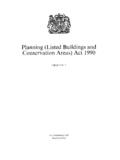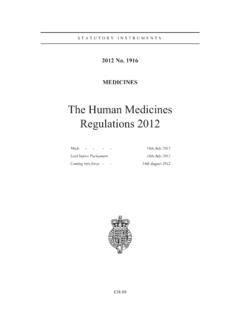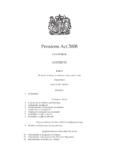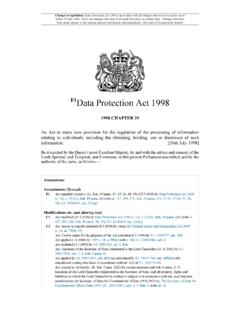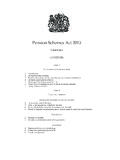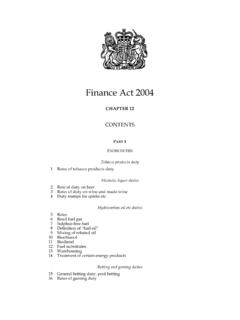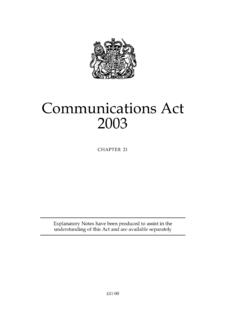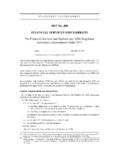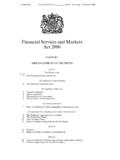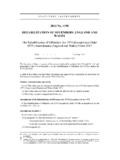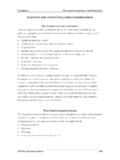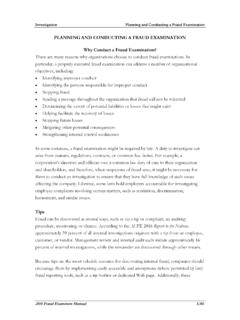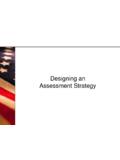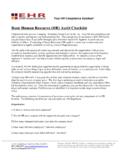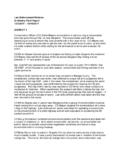Transcription of CODE OF PRACTICE FOR ARRANGING AND …
1 CODE OF PRACTICE FOR ARRANGING AND conducting . INTERVIEWS OF witnesses notified BY THE ACCUSED. Preamble This code of PRACTICE is issued under section 21A of the Criminal Procedure and Investigations Act 1996 ( the Act'). It sets out guidance that police officers and other persons charged with investigating offences must follow if they arrange or conduct interviews of proposed witnesses whose details are disclosed to the prosecution by an accused person pursuant to the disclosure provisions in Part I of the Act. Introduction Part I of the Act sets out rules governing disclosure of information in the course of criminal proceedings by both the prosecution and persons accused of offences to which that Part of the Act applies.
2 Sections 5 and 6 of the Act provide for accused persons to give defence statements to the prosecution and to the court and section 6A sets out what those defence statements must contain. Section 6A(2) requires that any defence statement that discloses an alibi must give particulars of it, including prescribed details of any witness who the accused believes is able to give evidence in support of the alibi and any information the accused has which may assist in identifying or finding such a witness. Section 6C of the Act requires the accused to give to the prosecutor and the court a notice indicating whether he intends to call any witnesses at trial and giving details of those witnesses .
3 This code of PRACTICE sets out guidance that police officers and other persons charged with investigating offences must have regard to when they are ARRANGING and conducting interviews of proposed witnesses identified in a defence statement given under section 6A(2) of the Act or a notice given under section 6C of the Act. Definitions 2. In this code: - the accused means a person mentioned in section 1(1) or (2) of the Act. - an appropriate person means: (a) in the case of a witness under the age of 18: (i) the parent, guardian or, if the witness is in local authority or voluntary organisation care, or is otherwise being looked after under the Children Act 1989, a person representing that authority or organisation; or (ii) a social worker of a local authority; or (iii) failing these, some other responsible person aged 18 or over who is not a police officer or employed by the police.
4 And (b) in the case of a witness who is mentally disordered or mentally vulnerable: (i) a relative, guardian or other person responsible for the witness's care or custody; or (ii) someone experienced in dealing with mentally disordered or mentally vulnerable people but who is not a police officer or employed by the police; or (iii) failing these, some other responsible person aged 18 or over who is not a police officer or employed by the police. - an investigator is a police officer or any other person charged with the duty of investigating offences. - a witness is a potential witness identified by an accused person either: - in a defence statement under section 6A(2) of the Act as being a witness that he believes is able to give evidence in support of an alibi disclosed in the statement; or - in a notice given to the court and the prosecutor under section 6C of the Act as being a person that he intends to call as a witness at his trial.
5 Arrangement of the interview Information to be provided to the witness before any interview may take place If an investigator wishes to interview a witness, the witness must be asked whether he consents to being interviewed and informed that: x an interview is being requested following his identification by the accused as a proposed witness under section 6A(2) or section 6C of the Act, x he is not obliged to attend the proposed interview , x he is entitled to be accompanied by a solicitor at the interview (but nothing in this code of PRACTICE creates any duty on the part of the Legal Services Commission to provide funding for any such attendance), and x a record will be made of the interview and he will subsequently be sent a copy of the record.
6 If the witness consents to being interviewed, the witness must be asked: x whether he wishes to have a solicitor present at the interview , x whether he consents to a solicitor attending the interview on behalf of the accused, as an observer, and x whether he consents to a copy of the record being sent to the accused. If he does not consent, the witness must be informed that the effect of disclosure requirements in criminal proceedings may nevertheless require the prosecution to disclose the record to the accused (and any co-accused) in the course of the proceedings. Information to be provided to the accused before any interview may take place The investigator must notify the accused or, if the accused is legally represented in the proceedings, the accused's representatives: x that the investigator requested an interview with the witness, x whether the witness consented to the interview , and x if the witness consented to the interview , whether the witness also consented to a solicitor attending the interview on behalf of the accused, as an observer.
7 If the accused is not legally represented in the proceedings, and if the witness consents to a solicitor attending the interview on behalf of the accused, the accused must be offered the opportunity, a reasonable time before the interview is held, to appoint a solicitor to attend it. Identification of the date, time and venue for the interview 5. The investigator must nominate a reasonable date, time and venue for the interview and notify the witness of them and any subsequent changes to them. Notification to the accused's solicitor of the date, time and venue of the interview 6.
8 If the witness has consented to the presence of the accused's solicitor, the accused's solicitor must be notified that the interview is taking place, invited to observe, and provided with reasonable notice of the date, time and venue of the interview and any subsequent changes. Conduct of the interview The investigator conducting the interview 7. The identity of the investigator conducting the interview must be recorded. That person must have sufficient skills and authority, commensurate with the complexity of the investigation, to discharge his functions effectively. That person must not conduct the interview if that is likely to result in a conflict of interest, for instance, if that person is the victim of the alleged crime which is the subject of the proceedings.
9 The advice of a more senior officer must always be sought if there is doubt as to whether a conflict of interest precludes an individual conducting the interview . If thereafter the doubt remains, the advice of a prosecutor must be sought. Attendance of the accused's solicitor The accused's solicitor may only attend the interview if the witness has consented to his presence as an observer. Provided that the accused's solicitor was given reasonable notice of the date, time and place of the interview , the fact that the accused's solicitor is not present will not prevent the interview from being conducted.
10 If the witness at any time withdraws consent to the accused's solicitor being present at the interview , the interview may continue without the presence of the accused's solicitor. The accused's solicitor may attend only as an observer. Attendance of the witness's solicitor 9. Where a witness has indicated that he wishes to appoint a solicitor to be present, that solicitor must be permitted to attend the interview . Attendance of any other appropriate person 10. A witness under the age of 18 or a witness who is mentally disordered or otherwise mentally vulnerable must be interviewed in the presence of an appropriate person.
